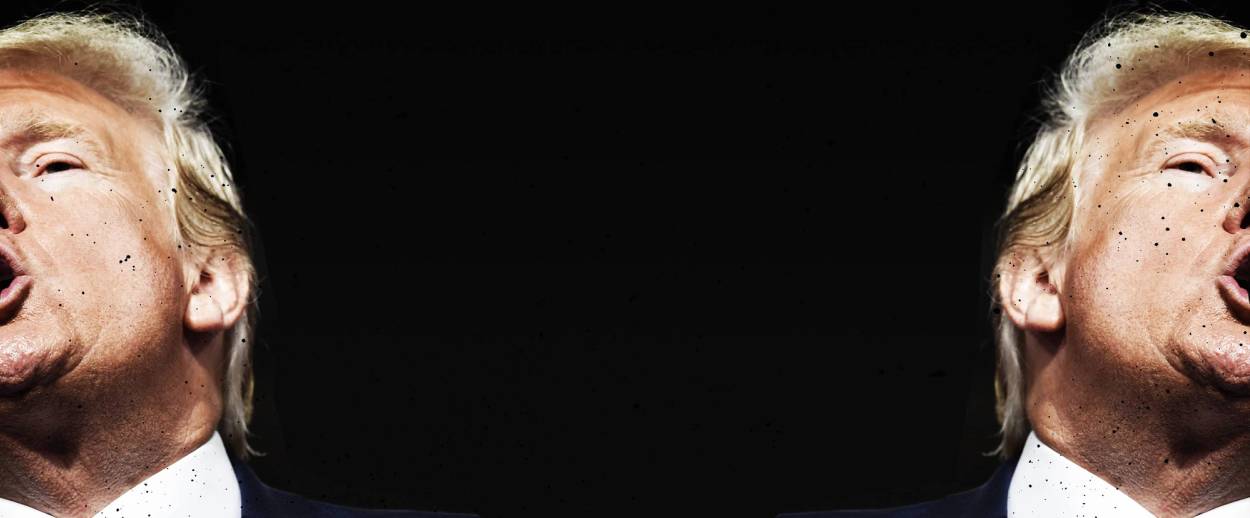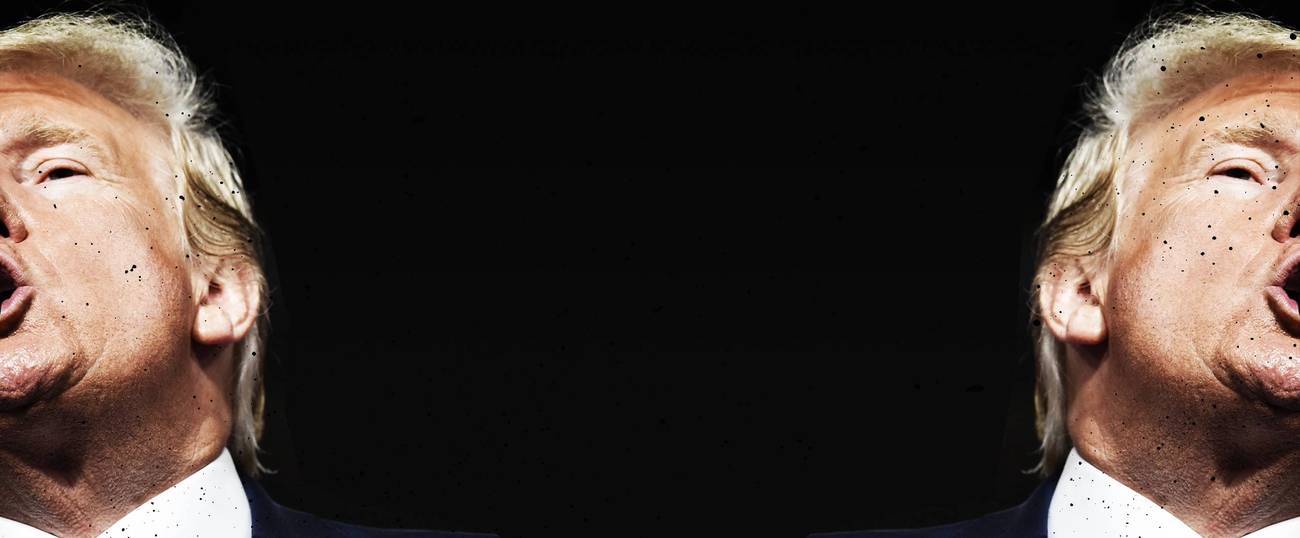Donald Trump’s Iran Policy Rides Two Horses at Once
If the ‘maximum pressure’ campaign against Iran seems incompatible with Trump’s isolationist instincts and antiwar rhetoric, that’s because it is




Donald Trump’s Iran policy, both right and left agree, is in chaos. More than a year after withdrawing from the Iran nuclear deal, officially known as the Joint Comprehensive Plan of Action (JCPOA), both advocates of restoring the deal and Iran hawks are baffled, with both enjoying moments of brief hope followed by deep despair that their preferred policies will be implemented by an unpredictable president.
The Trump administration calls its Iran policy “maximum pressure,” but there’s plenty of evidence to the contrary. To take only the most recent example, last month Trump renewed five waivers allowing Russia, China, and European powers to partner with Iran on its civilian nuclear program. This decision energized JCPOA supporters who hope that the Iran Deal can be restored in all its glory.
And yet, at the same time, Iran hawks were cheered when the White House imposed sanctions on Iran’s foreign minister, Javad Zarif. Trump ended dreams of a quick movement towards renegotiating and reestablishing the JCPOA by putting Iran’s primary interlocutor on ice.
In July, the International Atomic Energy Agency found that Iran was in non-compliance with the deal for having exceeded the limits of uranium enrichment. In response to this news, Trump could, and should, invoke multilateral snapback sanctions, making it harder for Iran to build nuclear weapons. Secretary of State Mike Pompeo seemed to suggest as much last week with a somewhat cryptic tweet warning that the arms embargo on Iran is due to expire in 15 months, unless the U.S. and its allies “increase the pressure on the Iranian regime until it stops its destabilizing behavior.”
So is Trump holding onto the deal with one hand while strangling it with the other? Is he aiming to renegotiate it or is he just trolling everyone?
It’s tempting to attribute Trump’s scattershot Iran policy to a political novice’s lack of discipline, or even more damningly to the president’s personal flaws. However, conversations with senior U.S. officials, including administration hands, suggest the issue is partly about policy but largely about politics.
Trump has two different administrations—one that wants to collapse the JCPOA and another that wants to preserve it. These roughly intersect with the two camps that represent his divided base—one hawkish on Iran and another that wants no more U.S. wars in the Middle East. The trick is to manage both parts of his administration in order to show both sides of his base that he’s kept to the promises that won him the nomination in 2016—get out of the Iran deal and avoid more endless, failed wars like Iraq and Afghanistan.
The anti-JCPOA administration is led by National Security Adviser John Bolton and Pompeo who last year issued 12 demands of Iran, including that the country should stop uranium enrichment; allow “unqualified access” to all nuclear-related sites; stop supporting militant groups in Lebanon, Iraq, Yemen as well as the Islamic Revolutionary Guard Corps; stop threatening Israel; and release U.S. and allied hostages. That’s a maximalist position, demanding not only that Iran give up its dreams of a bomb but that it also stop being the Islamic Republic.
The pro-deal camp in the Trump administration largely resides in the Treasury Department—it was Treasury Secretary Steve Mnuchin who convinced Trump not to revoke the five nuclear waivers—and, paradoxically, in Pompeo’s State Department.
While no one can explain why Pompeo has failed to clean out the holdovers from Rex Tillerson’s tenure who are working furiously to save the deal, the pro-JCPOA crowd in the State Department is serving an important role in the Trump universe. They’re pushing the message—diplomacy, not war, anything but war—that Trump needs in order to keep the isolationist part of his base on board.
* * *
Compare Trump’s task to that of his predecessor. Barack Obama had a largely coherent base eager to follow him on the Iran deal. The stragglers were the pro-Israel advocates, who were forced into line by a messaging campaign that accused them of dual loyalty for opposing the deal.
Trump has two camps that are hard to reconcile. What makes it even more difficult to manage the isolationists and the Iran hawks is that the Iranians are aware of Trump’s dilemma. They’re testing him. In recent months, the Iranians sabotaged two oil tankers, seized a British-flagged tanker, and shot down a U.S. military drone in international airspace over the Strait of Hormuz.
But Tehran knows not to push too hard. A major attack on U.S. forces in the Gulf, for instance, would put the most vocal antiwar Republicans in the difficult position of having to argue for ignoring mass American casualties.
Short of that, Trump has to watch his step. Accordingly, he looks for opportunities to show he’s listening to the party’s isolationist camp. For instance, after the drone incident, Trump dramatically reversed his decision to retaliate. The point was to show that he’s not looking to get into any sort of hot conflict. Rather, he’s the guy who went out of his way to avoid war with Iran.
At the same time, Trump must also convince the hawks that he’s tough on the Iranians. By imposing the strongest sanctions ever on the regime, and thereby putting a dent in the regime’s war chest, he’s shown he’s not Obama.
But just as Trump’s two bases are irreconcilable so are the two components of his Iran policy. He emphasizes diplomacy and says he wants a deal. He has no problem with Sen. Rand Paul, or French President Emanuel Macron or Japanese Prime Minister Shinzo Abe or anyone else who offers to mediate with Tehran—hey let me know what they say, tell them I’d love to do a deal, they have my number, etc.
But Trump wants that deal on his own maximalist terms. So he continues to apply more pressure, more sanctions, in the hope Iran will come to its senses, stop ransoming U.S. and European citizens, targeting oil tankers, and talk. After all, Iran has a supreme leader, and Trump is the supreme dealmaker. But the deal that Trump envisions isn’t really a deal at all. It’s Iran folding, and abandoning hope of ever getting the bomb. That’s the endgame.
* * *
To see how Trump’s Iran policy might play out in the next year, and subsequently should he win reelection, it’s useful to demythologize some recent history. Despite all the messaging campaigns for and against the JCPOA, and the related political hoopla, the fight over the Iran deal was largely a mirage. Washington, left and right, is fundamentally a pro-Iran city.
For 40 years the collective dream of the foreign policy establishment has been rapprochement with Iran. For the left, the regime is the standard-bearer of international resistance, at the head of the long march against imperialism and Zionism. For the right, the Islamic Republic is the manifestation of a tragic misunderstanding, for which benighted U.S. policy must share the blame. Every administration since the Iranian revolution, Democratic and Republican, has sought to reconcile with the Islamic Republic.
By contrast, the number of genuine Iran hawks on Capitol Hill is vanishingly small, which is one reason why, for instance, Trump ally Tom Cotton is not in the administration but still in the Senate, where he gives the anti-Iran bench needed depth.
Structurally it was also easy for Obama to drag Washington and Europe into realignment with Iran because that decision fit the shape of post-9/11 U.S. regional security architecture. Since the 2003 US-led invasion of Iraq, the effect of U.S. policy has been to strengthen Iran. First was toppling Saddam Hussein, the only Arab check on Iranian expansionism. Next was the surge, an intra-Sunni conflict that left Iraq’s Iranian-allied Shia community the big winner.
The Pentagon’s counterterrorism efforts target Sunni terrorist groups while leaving similarly bloody, and much more dangerous, Iranian-allied Shia groups alone. In fact, the U.S. supports Iranian auxiliary forces in Lebanon and Iraq. The State Department’s state-building efforts in those countries support institutions under Iranian control. That is, even outside the parameters of the Iran deal, Washington has poured billions of dollars into initiatives that serve Iranian interests, while greasing the wheels of the Beltway’s bureaucratic machinery.
By crashing the JCPOA, Trump will be taking on European and Asian industry as well as the Beltway bureaucracy, led by the Pentagon and State Department—all interests with defenders on both sides of the aisle in Congress. Further, he will be doing so without any analogous constituency of his own, because it is very difficult to build a lobby for a policy that creates no jobs and throws off no money. Flogging the JCPOA to death means pulling the plug. It also means Trump is going to have very few allies, at home or abroad.
Another important piece of demythologizing involves the nature of the Obama administration’s negotiations with Iran. Like the domestic fight over the deal, the negotiations, too, were largely smoke and mirrors. The JCPOA was never about preventing Iran from getting a bomb. Rather, it was about offering incentives that would convince Iran to hold off building a bomb until Obama left office. Proof is in the JCPOA’s sunset provisions, restraints on Iran that are due to expire at various intervals, beginning in 2020.
Obama simply kicked the can down the road and now the end of the road has started to appear on the horizon line. Seen from this perspective, Trump’s demands are not maximalist compared to the other even more extreme option—an expansionist regional power and state sponsor of international terror with a nuclear weapon. Something has to give. Trump’s counting on the fact it will be Iran, and that they’ll cave without an escalation that may wind up costing him support back home.
***
Like this article? Sign up for our Daily Digest to get Tablet magazine’s new content in your inbox each morning.
Lee Smith is the author of The Permanent Coup: How Enemies Foreign and Domestic Targeted the American President (2020).